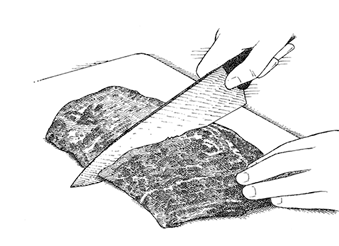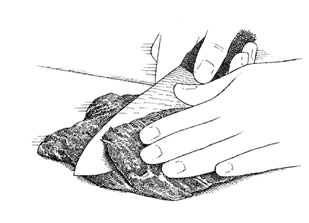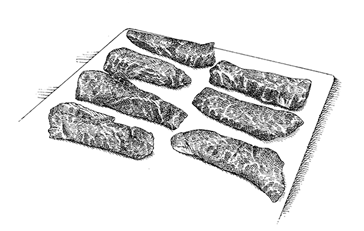The Cook's Illustrated Cookbook (226 page)
Read The Cook's Illustrated Cookbook Online
Authors: The Editors at America's Test Kitchen
Tags: #Cooking
THE MAGIC OF BRINERATING
Successful marinating is all about getting as much of the soaking liquid flavors into (and on) the meat as possible. Brining in a saltwater solution is a way to create more juiciness. To pump up flavor as well as juiciness, our marinades combine both approaches, with soaking liquids that not only contain lots of seasonings and flavorings but so much salt (often in the form of soy sauce), you might even call them “brinerades.” As in a brine, salt in a marinade affects meat in two ways. Through osmotic pressure it pulls moisture from a place of higher water concentration (the marinade) into a place with a lower one (the meat). In addition, it restructures the protein molecules in the meat, creating gaps that fill with water to further increase juiciness. It also seasons the meat, enhancing its inherent flavors.
MAKES ABOUT
³⁄
4
CUP, ENOUGH FOR 1 RECIPE
GRILLED STEAK TIPS
¹⁄ | cup soy sauce |
¹⁄ | cup vegetable oil |
3 | garlic cloves, minced |
1 | tablespoon packed dark brown sugar |
1 | tablespoon tomato paste |
1 | tablespoon chili powder |
2 | teaspoons ground cumin |
¹⁄ | teaspoon cayenne pepper |
Combine all ingredients in bowl.
MAKES ABOUT
²⁄
3
CUP, ENOUGH FOR 1 RECIPE
GRILLED STEAK TIPS
¹⁄ | cup soy sauce |
3 | tablespoons vegetable oil |
3 | tablespoons toasted sesame oil |
2 | tablespoons packed dark brown sugar |
1 | tablespoon grated fresh ginger |
2 | teaspoons grated orange zest |
1 | scallion, sliced thin |
3 | garlic cloves, minced |
¹⁄ | teaspoon red pepper flakes |
Combine all ingredients in bowl.
MAKES ABOUT
³⁄
4
CUP, ENOUGH FOR 1 RECIPE
GRILLED STEAK TIPS
¹⁄ | cup soy sauce |
¹⁄ | cup olive oil |
3 | garlic cloves, minced |
1 | tablespoon minced fresh rosemary |
1 | tablespoon minced fresh thyme |
1 | tablespoon packed dark brown sugar |
1 | tablespoon tomato paste |
1 | teaspoon pepper |
Combine all ingredients in bowl.

1.
Cut steak with grain into 2 or 3 even pieces.

2.
Hold knife at 45-degree angle to meat and cut ¹⁄
2
-inch-thick slices.

3.
Each piece of steak should yield 4 to 5 slices.
![]() WHY THIS RECIPE WORKS
WHY THIS RECIPE WORKS
Like filet mignon, grilled strip or rib-eye steaks are premium steaks. These cuts boast big, beefy flavor and require little adornment beyond salt and pepper, although a spice rub or marinade offers further flavor. To ensure that these steaks came off the grill with a charred exterior and perfectly tender interior, we built a fire with two heat zones, starting the steaks over the hot side and moving them to the cooler side to finish cooking through. Resting the steaks before serving is key—if sliced into right off the grill, the meat will exude its flavorful juices and be dry.
See “AVOIDING CROSS-CONTAMINATION” illustrations that follow recipe.
SERVES 6
Try to buy steaks of even thickness so they cook at the same rate.
4 | (12- to 16-ounce) strip or rib-eye steaks, with or without bone, 1¹⁄ |
Salt and pepper |
1A. FOR A CHARCOAL GRILL:
Open lid vent completely. Light large chimney starter filled with charcoal briquettes (6 quarts). When top coals are partially covered with ash, pour two-thirds evenly over grill, then pour remaining coals over half of grill. Set cooking grate in place, cover, and heat grill until hot, about 5 minutes.
1B. FOR A GAS GRILL:
Turn all burners to high, cover, and heat grill until hot, about 15 minutes. Leave one burner on high and turn other burner(s) to medium.
2.
Clean and oil cooking grate. Pat steaks dry with paper towels and season with salt and pepper. Place steaks on grill (hotter side if using charcoal) and cook, uncovered, until well browned on both sides, 4 to 6 minutes, flipping steaks halfway through cooking. Move steaks to cooler side of grill (if using charcoal) or turn all burners to medium (if using gas) and continue to cook until meat registers 115 to 120 degrees (for rare) or 120 to 125 degrees (for medium-rare) 5 to 8 minutes longer.
3.
Transfer steaks to serving platter, tent loosely with aluminum foil, and let rest for 10 minutes before serving.
Grilled meat, poultry, and fish should not be returned to the same platter that was used to carry the raw food to the grill. Instead of last-minute fumbling for a clean platter, this method uses a single platter for both jobs and saves on cleanup time.

1.
Cover platter with aluminum foil before placing raw food on it.

2.
While food is grilling, remove foil so that you can use same platter when food comes off grill.
![]() WHY THIS RECIPE WORKS
WHY THIS RECIPE WORKS
Marinades are supposed to make steaks more flavorful and tender, but most do neither. We wanted our marinades to accomplish both these tasks, without having to marinate the meat overnight. We started with soy sauce. The salt in soy sauce acted much like a brine, helping the meat retain moisture during cooking and making it more tender. For depth of flavor, we added more strong seasonings. We found some of them in the international section of the supermarket, with ingredients as diverse as red curry paste, Dijon mustard, and chipotle chiles. We divided up the marinade’s tasks to meet our time limit. After setting aside some of the marinade, we marinated the meat to tenderize it. Then, before we allowed the cooked steak to rest, we dipped it in the reserved marinade to absorb flavor.